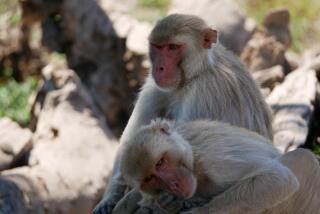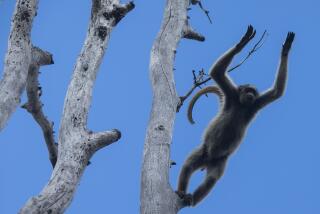Tests on Monkeys Offer Hope to Balding Men
- Share via
Calling the research “encouraging” for balding men, a Canadian physician Wednesday said an experimental drug has prevented baldness in a type of monkey that grows bald in a pattern similar to humans.
Stumptail macaque monkeys whose foreheads were smeared with the research drug--not approved for human use--showed no signs of baldness after more than two years of treatment, while untreated monkeys lost their hair, said Dr. R. S. Rittmaster, an assistant professor of medicine at Dalhousie University in Halifax, Nova Scotia.
‘It’s Encouraging’
“I can’t say it’s applicable (to humans), but it’s encouraging,” Rittmaster said at the international meeting of the Endocrine Society at Anaheim Convention Center. Endocrinology is the study of the secretion of hormones and their effects on the body.
Tests on humans using the research drug or a similar compound have yet to be performed and could be difficult because men go bald much more slowly than the monkeys do and the research would take many years, Rittmaster said.
In addition, monkeys “don’t tend to bathe” and wash off the drug, he said.
“Male pattern baldness,” the most common form of human baldness, is dependent on the male hormone dihydrotestosterone, which is converted from testosterone by an enzyme, Rittmaster said.
The research drug in the study, 4-MA, blocks that enzyme so that the balding-related hormone is not produced, he said. Rittmaster conducted the study with four other researchers under the auspices of the National Institutes for Health.
The stumptail macaque monkey naturally goes bald, in a pattern similar to humans, beginning at two or three years, and the hair loss is usually advanced three or four years later, Rittmaster said.
Researchers applied the drug to the foreheads of three 2- and 3-year-old stumptail monkeys and shaved a patch of their foreheads every two months, weighing the cut hair. Twenty-eight months later, the monkeys treated with the drug were growing “basically the same amount of hair” while the monkeys which had been treated with a placebo went bald, Rittmaster said.
Rittmaster cautioned that it is “premature” to conclude the findings can be applied to human baldness. “Physiologically, it makes 100% sense,” he said. “But whether you can get enough of the drug there and keep it there long enough (on humans) is the big question.”
More to Read
Sign up for Essential California
The most important California stories and recommendations in your inbox every morning.
You may occasionally receive promotional content from the Los Angeles Times.












